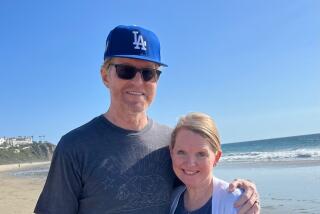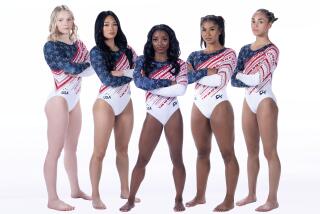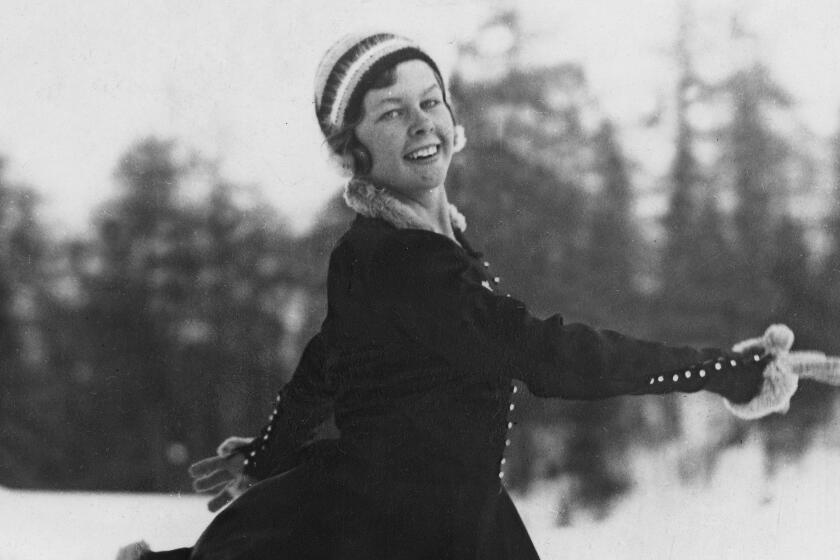NBC Would Be Content to Finish With No Meddles
In these days of multiple television households, families rarely watch anything together.
While Dad is tuned into a ballgame in the bedroom, Mom may be watching “ER” in the family room, and the kids are watching MTV or Comedy Central in their bedrooms.
“The Olympics are the only major sporting event that draws women in equal numbers to men, and that tells you this is television’s last great family viewing event,” said Dick Ebersol, the president of NBC Sports.
“You may have to go back 30 years to the ‘Ed Sullivan Show’ to find something with the same family appeal.”
That may be the main reason NBC was willing to pay $456 million for the right to broadcast 171 1/2 hours--78 in prime time--of Olympics over 17 days, beginning with Friday’s opening ceremony at 5 p.m. PDT.
An independent survey of 1,000 Americans by Yankelovich Partners, a New York marketing research firm, supports Ebersol’s claim. It shows 82% of the men and 82% of the women polled plan to watch at least part of the Olympics, although it also shows men prefer track and field and basketball and women prefer gymnastics and swimming.
“Sports on television are generally results driven, but the Olympics are a different ball of wax,” Ebersol said. “Storytelling is the absolute key to the Olympics.”
That is a philosophy that Olympic documentarian Bud Greenspan has been using to make award-winning films, and it is now a philosophy embraced by the networks.
Ebersol said 10,000 Americans were surveyed in recent years to determine their views on Olympic coverage, and the surveys showed people like the stories and they like them told well and they like them told completely.
“If you’ll pardon the expression, we’ll leave no story before its time,” he said.
Ebersol also promised there won’t be fragmented coverage of events.
“We’re not going to jump around just to prove we can jump around,” he said.
And no split screens.
“One thing we always look back at was at Seoul [in 1988, before Ebersol took charge] when Greg Louganis was going for a gold medal, there was a split screen of a volleyball match,” Ebersol said. “We’re certainly not going to do anything like that.”
Although the morning segments in the West will be delayed two hours, prime-time coverage will be shown at the same time across the country--beginning weeknights at 7:30 in the East and 4:30 in the West.
Since NBC plans to open each prime-time segment with a major event--the first seven nights will open with a swimming final--West Coast viewers who work 9-5 jobs will need to set their VCRs.
Ebersol said most of what viewers will see in the prime-time segments will be live.
“But we won’t leave one event just to show another one live. We want to finish each story, and if that means showing something on tape, then that’s what we will do.”
While it’s true viewers like stories (about 140 features have been prepared for these Games) and dislike fragmented coverage, what they really hate are all those commercials. Ebersol promises fewer of them than in any recent Olympics.
“We had 10 minutes of commercials per hour at Barcelona [in 1992], and we’ll be under or right at nine minutes per hour in Atlanta,” he said.
“At Seoul, when there were make-goods [free commercial spots to make up for lower-than-promised ratings], there were as many as 15 minutes per hour.”
The key to delivering fewer commercials is selling to fewer advertisers.
“We had about 120 advertisers in Barcelona,” Ebersol said, “and we’ll have 48 in Atlanta. The sales pitch was buy early and buy big.”
Ebersol said NBC initially projected sales of $520 million, but the network has topped $680 million.
“We sold 30-second spots for as much as $500,000, and we sold every unit at full price,” he said.
NBC is getting its money’s worth, since it has the Olympics exclusively.
“This is the last Olympics in which there will be no cable partner,” Ebersol said.
CBS figures to have a cable partner for the 1998 Winter Olympics in Nagano, Japan, and NBC, which will televise every Olympics after that through 2008, will have use of cable partner CNBC to help cover the Sydney Olympics in 2000.
“NBC was able to obtain exclusive rights this time because our affiliates agreed to put up $60 million toward the rights fee,” Ebersol said.
They did that mainly so they wouldn’t be competing against cable for commercial spots.
NBC will use approximately 2,800 people to cover the Olympics, with 2,500 in Atlanta and 300 more in New York. NBC will use fiber-optic technology to link the two broadcast centers.
Ebersol said just about everything is in place for the massive task of covering an Olympics. About all that remains are the Games themselves.
(BEGIN TEXT OF INFOBOX / INFOGRAPHIC)
Watching the Games
A look at the NBC team that will be providing coverage for the Games:
Hosts, Announcers
Prime Time: Bob Costas
Daytime: Greg Gumbel
Weekend Daytime: Ahmad Rashad
Coorespondent: Katie Couric
Olympic Moments: Dick Enberg
Late Night: Jim Lampley
Late Night: Hannah Storm
Basketball: Marv Albert
*
Event Announcers
Men’s Basketball: Marv Albert, Matt Guokas, Magic Johnson. Reporter: Cheryl Miller.
Women’s Basketball: Mike Breen, Cheryl Miller.
Beach Volleyball: Randy Rosenbloom, Kirk Kilgour. Reporter: Bill Walton.
Boxing: Bob Papa, Al Bernstein. Reporter: Beasley Reece, Marv Albert (selected bouts).
Diving: Dan Hicks, Cynthia Potter. Reporter: Mary Ann Grabavoy.
Equestrian: Jim Simpson, Melanie Smith-Taylor.
Flatwater Canoeing, Kayaking: Charlie Jones, Bill Endicott.
Gymnastics: John Tesh, Elfi Schlegel, Tim Daggett, Beth Ruyak.
Road cycling: Al Trautwig, Phil Leggett (men’s), Tom Hammond (women’s).
Rowing: Charlie Jones, Bob Ernst.
Soccer: Jim Donovan, Seamus Malin.
Synchronized swimming: Don Criqui, Tracy Ruiz-Conforto.
Swimming: Dan Hicks, Rowdy Gaines, Summer Sanders. Reporter: Jim Gray.
Tennis: Bud Collins.
Track Cycling: Phil Leggett, Greg LeMond.
Track & Field: Tom Hammond, Dwight Stones, Craig Masback, Carol Lewis. Reporter: Cris Collinsworth.
Marathons: Tom Hammond, Frank Shorter, Craig Masback.
Volleyball: Chris Marlowe, Paul Sunderland. Reporter: Bill Walton.
Water Polo: Don Criqui, Jim Kruse.
Weightlifting: Bob Trumpy, Phil Simms.
Whitwater Canoeing: Al Trautwig.
Wrestling: Russ Hellickson, Jeff Blatnick.
TV Times for Opening Day and Weekends
* FRI., JULY 19
5-9 p.m.
* SAT., JULY 20
Noon-3 p.m.; 4:30-9 p.m.; 9:30-11 p.m.
* SUN., JULY 21
9 a.m.-3 p.m.; 4-9 p.m.; 9:30-11 p.m.
* SAT., JULY 27
9 a.m.-2:30 p.m.; 3:30-9 p.m.; 9:30-11 p.m.
* SUN., JULY 28
6-9 a.m.; 9 a.m.-3 p.m.; 4-9 p.m.; 9:30-11 p.m.
* SAT., AUG. 3
9 a.m.-3 p.m.; 4-9 p.m.; 9-30-11 p.m.
* SUN., AUG. 4
4 a.m.-2:30 p.m.; 3:30-8:30 p.m.
More to Read
Go beyond the scoreboard
Get the latest on L.A.'s teams in the daily Sports Report newsletter.
You may occasionally receive promotional content from the Los Angeles Times.





